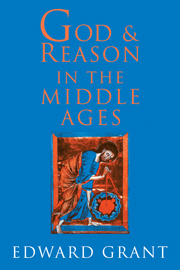Book contents
- Frontmatter
- Contents
- Acknowledgments
- Introduction
- 1 The Emergence of a Transformed Europe in the Twelfth Century
- 2 Reason Asserts Itself: The Challenge to Authority in the Early Middle Ages to 1200
- 3 Reason Takes Hold: Aristotle and the Mediveal University
- 4 Reason in Action: Logic in the Faculty of Arts
- 5 Reason in Action: Natural Philosophy in the Faculty of Arts
- 6 Reason in Action: Theology in the Faculty of Theology
- 7 The Assault on the Middle Ages
- Conclusion: The Culture and Spirit of “Poking Around”
- Bibliography
- Index
Introduction
Published online by Cambridge University Press: 28 August 2009
- Frontmatter
- Contents
- Acknowledgments
- Introduction
- 1 The Emergence of a Transformed Europe in the Twelfth Century
- 2 Reason Asserts Itself: The Challenge to Authority in the Early Middle Ages to 1200
- 3 Reason Takes Hold: Aristotle and the Mediveal University
- 4 Reason in Action: Logic in the Faculty of Arts
- 5 Reason in Action: Natural Philosophy in the Faculty of Arts
- 6 Reason in Action: Theology in the Faculty of Theology
- 7 The Assault on the Middle Ages
- Conclusion: The Culture and Spirit of “Poking Around”
- Bibliography
- Index
Summary
MOST WHO STUDY THE POLITICAL, SOCIAL, INSTITUTIONAL, AND intellectual developments in Western Europe during the Middle Ages find it easy to believe that “Western civilization was created in medieval Europe.” George Holmes, the author of that sweeping statement, argues further that
[t]he forms of thought and action which we take for granted in modern Europe and America, which we have exported to other substantial portions of the globe, and from which indeed, we cannot escape, were implanted in the mentalities of our ancestors in the struggles of the medieval centuries.
Just what was implanted in the peoples of the Middle Ages between approximately 1050 to 1500? Nothing less than a capacity for establishing the foundations of the nation state, parliaments, democracy, commerce, banking, higher education, and various literary forms, such as novels and history. By the late Middle Ages, Europe had also produced numerous laborsaving technological innovations. The profound problems involved in reconciling church and state, and natural philosophy and Scripture were first seriously encountered in this same period. Indeed, it was during the Middle Ages that canon and civil law were reorganized and revitalized. Not only did these newly fashioned disciplines lay the foundations of Western legal systems, but from the canon law also came the concept of a corporation, which enabled various institutions in the West – commercial, educational, and religious – to organize and govern themselves in a manner that had never been done before.
- Type
- Chapter
- Information
- God and Reason in the Middle Ages , pp. 1 - 16Publisher: Cambridge University PressPrint publication year: 2001



